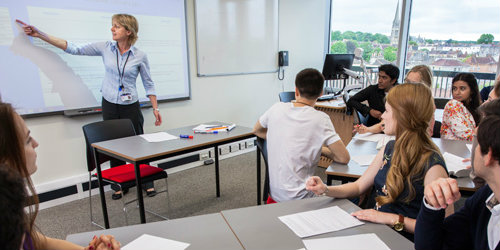Supporting Early Years transition to school
Examining the effects of the Covid-19 pandemic on early years transition to school, with a focus on children with SEND and children from disadvantaged backgrounds.
The challenge
The transition to primary school is a critical period for children and their families. In 2020, national lockdown, closure of educational settings and social distancing measures caused by the Covid-19 pandemic meant that transition practices were severely disrupted. Support for the transition of young children from nursery to school was inevitably affected, with greater consequences for children with SEND and children from disadvantaged backgrounds.
Research impact - Best practice in supporting transition to school post Covid-19
With the first national lockdown in March 2020, the closures of educational settings and social distancing measures, transition practices were severely disrupted and support for the transition of young children from nursery to school was limited. In the Summer 2020, the Bristol City Council Early Years Team commissioned Ioanna and her research team to investigate the impact of the Covid-19 pandemic on early years transitions to school, with a focus on young children with SEND.
At a local level, the research team produced a Research Summary and Good Practice Guide that has been shared with key stakeholders at Bristol Early Years Team as well as all early years settings and primary schools in Bristol. This contained key research findings along with a series of recommendations to support the early years workforce with preparing for the transition of children to primary school.
In the UK, our research has contributed to policy debate and reform with findings of our research feeding into the Covid-19: Education Enquiry which aimed to question senior officials at the Department for Education on how well it managed its overall response in the first lockdown, including whether it effectively supported schools and pupils in England during this period and whether it supported vulnerable and disadvantaged children (https://publications.parliament.uk/pa/cm5802/cmselect/cmpubacc/240/24002.htm). Evidence from our work highlighted the need for both Central and Local Governments to adopt a consistent and systematic approach in relation to transition to school and communicate clearer expectations for early years settings on how to support children’s transition to school.
Ioanna was also invited to present findings of the research to the All Party Parliamentary Group on a Fit and Healthy Childhood contributing to public debates about where the focus of recovery from the effects of the disruption caused by the pandemic needs to be placed (https://fhcappg.org.uk/?p=3193). Ioanna’s presentation highlighted how pre-existing challenges that relate to transition support have been much exacerbated by the Covid-19 pandemic and have been particularly damaging for children with SEND and children from disadvantaged background. A participant at the APPG session commented after Ioanna’s presentation:
“Such an important piece of work. Such striking results about what was done to support our most vulnerable young children who have suffered so much during the pandemic. And absolutely fantastic to see so clearly presented what is needed to support our absolutely amazing early years workforce to continue doing what they have been doing all along!’’
Finally, Ioanna presented findings of the research at a research workshop with colleagues from the Department for Education given the fact that supporting transitions of the most vulnerable children is a priority research area for the Department for Education. Following the workshop, colleagues from the Department for Education have very helpfully supported Ioanna in advertising her new research project in primary schools in South-West of England. Ioanna’s new project is investigating the impact of the Covid-19 pandemic on children’s first year at school, with a particular focus on children with SEND and children from disadvantaged backgrounds.
Underpinning research
Successful transition to school influences school achievement and socio-emotional outcomes with sustained long-term benefits1. Transition practices are especially critical for children with identified Special Educational Needs and Disabilities (SEND) and children from disadvantaged backgrounds2,3. At present there are no existing government guidelines and statutory requirement for educational settings to offer transition support. As a result, transition practice depends on local advice or on the approach of each receiving school.
Our research4 found that there were significant disruptions or delays in planning for transition as a result of the Covid-19 pandemic. Unclear, late, and not specific to early years government guidance that constantly changed was reported to be the most significant challenge when planning for the transition to school. Despite this, early years practitioners responded to the challenge by adapting their typical transition practices or by employing a range of new activities to prepare children for starting school. Transition practices for children with SEND presented unique challenges exacerbating and further emphasizing difficulties that already exist such as language and communication; physical development; social development and independence.
Overall, there was very little evidence of a consistent and systematic approach to early years transition planning across settings. As such, there is an urgent need for both Central and Local Governments to review what transition practices are effective and how are these practices linked to child outcomes. Creating government guidelines that include clear expectations needs to be a priority to ensure all settings can support smooth and positive transitions to school.
- Burrell, A. & Bubb, S. (2000). Teacher Feedback in the Reception Class: Associations with Children’s Positive Adjustment to School. Education, 28(3), 58 – 69.
- Rodriguez, C.D., Cumming, T.M., & Strnadova, I. (2017). Current practices in school transitions of students with developmental disabilities. International Journal of Educational Research, 83, 1-19.
- Crosnoe, R., & Cooper, C.E. (2010). Economically Disadvantaged Children’s Transitions into Elementary School: Linking Family Processes, School Contexts and Educational Policy. American Educational Research Journal, 47(2), 258-291.
- Bakopoulou, I., Triggs, P., & Novak, T. (2021). Research Report: The Impact of Covid-19 on early years transition to school. School of Education, University of Bristol. (89pp).
Researcher
Non-academic partner
Related research group
Centre for Psychological Approaches for Studying Education (PASE)
Publications
- Bakopoulou, I., Triggs, P., & Novak, T. (2021). Research Report: The Impact of Covid-19 on early years transition to school. School of Education, University of Bristol. (89pp).
- The Impact of COVID-19 on Early Years Transition to School, Document Service Summary
Date published
September 2021


 Study Education
Study Education
Join us in improving educational environments for future generations
